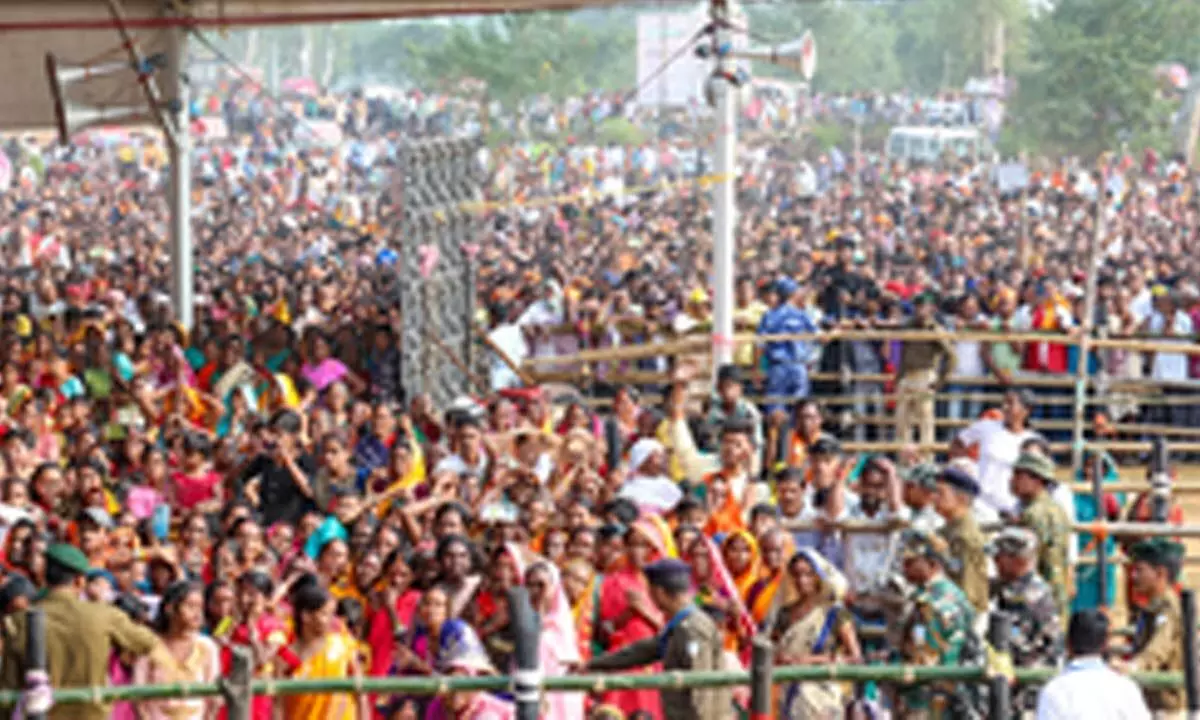Live
- Health condition of Jnanpith awardee Vasudevan Nair remains critical
- Tirumala to be developed as a model pilgrimage sestination, Says TTD EO Shyamala Rao
- “Reels Will Be Cut”: ACP Vishnu Hits Back at Allu Arjun’s Allegations
- 39 Transgenders Appointed as Traffic Assistants, Demo Program Held in Hyderabad
- Grand Celebration of the 18th Mahapadi Puja held at Shamshabad Ayyappa Temple
- MLA Sri Ganesh distributes cheques to beneficiaries under CMRF
- BGT: Do feel for Nathan, but totally understand why Australia dropped him, says Vaughan
- PM Modi accorded Guard of Honour at Kuwait's Bayan Palace
- Sports Minister flags off ‘Fit India Sundays on Cycle' initiative
- Brunei cracks down on activities of international drug cartel
Just In
Jharkhand polls: Issues of 'Roti, Beti, Maati' & tribal identity dominated campaign rhetoric

The campaign, which concluded on Monday for Jharkhand's 81-member Assembly elections, was marked by an intense political slugfest this time, with the NDA and INDIA Bloc making significant efforts to win over voters.
Ranchi: The campaign, which concluded on Monday for Jharkhand's 81-member Assembly elections, was marked by an intense political slugfest this time, with the NDA and INDIA Bloc making significant efforts to win over voters.
Over a 35-day campaign, star campaigners from both sides organised more than 500 major rallies, focusing on issues deeply tied to Jharkhand's socio-cultural fabric, such as 'Roti, Beti, Maati' (livelihood, women, and land), tribal identity, and populist welfare schemes.
For the first time in Jharkhand's electoral history, Bangladeshi infiltration became a prominent campaign issue. Prime Minister Narendra Modi launched the BJP’s narrative during a public meeting in Hazaribagh on October 2, calling infiltration the biggest threat to Jharkhand. He coined the slogan “Save Roti, Beti, Maati” (livelihood, women, and land), which became a central theme of the BJP’s aggressive campaign later on.
This issue was bolstered by a Jharkhand High Court decision in September, which ordered the formation of a joint central-state committee to address Bangladeshi infiltration in Santhal Pargana. The BJP leveraged this ruling, accusing the JMM-Congress-RJD coalition of enabling the infiltration. Union Home Minister Amit Shah, Assam Chief Minister Himanta Biswa Sarma, and Uttar Pradesh Chief Minister Yogi Adityanath amplified the BJP’s aggressive stance, with Yogi connecting the issue to his controversial slogan, “Batenge to Katenge” (If we are divided, we will perish).
INDIA Bloc leaders, including Rahul Gandhi, Mallikarjun Kharge, and Chief Minister Hemant Soren, dismissed the BJP's narrative, arguing that Jharkhand does not share a border with Bangladesh and that border control is a central government problem. Despite their rebuttal, the BJP kept the issue at the forefront of its campaign, emphasizing the issue rally after rally.
On the other side, the INDIA Bloc focused on tribal issues, particularly the demand for a Sarna Dharma Code. Tribals in Jharkhand have long sought recognition of their Sarna faith in census forms, as the current forms lack an option for Sarna or Adivasi religions.
The Hemant Soren government passed a resolution for a Sarna code in 2022 and sent it to the Centre. During the campaign, Soren and his allies accused the BJP of stalling the Bill and ignoring tribal concerns. While BJP leaders largely avoided discussing the Sarna code publicly, Amit Shah and others stated in press interactions that the matter required further discussion.
Populist welfare schemes were another major focus of the campaign. The Hemant Soren government highlighted its Maiya Samman Yojna, which provides Rs 1,000 monthly assistance to women aged 18–50 and increased the benefit to Rs 2,500 just before the elections. Under this scheme, 57 lakh women received direct cash transfers over four months.
To counter this, the BJP announced Gogo Didi Yojana, promising Rs 2,100 per month to women if elected. Both alliances also promoted other welfare promises, including subsidised gas cylinders, unemployment allowances, and other benefits.
This is Jharkhand’s fifth assembly election after it became a separate state. Campaign dynamics highlighted evolving voter concerns, with newer issues like infiltration taking precedence alongside longstanding ones. As voters make their choice, it remains to be seen which set of promises and priorities will resonate with voters in this crucial Assembly election.

© 2024 Hyderabad Media House Limited/The Hans India. All rights reserved. Powered by hocalwire.com






